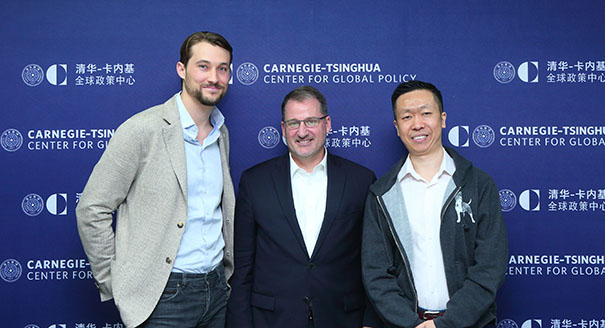{
"authors": [
"Paul Haenle",
"Ben Harburg",
"Andy Tian"
],
"type": "event",
"centerAffiliationAll": "",
"centers": [
"Carnegie Endowment for International Peace",
"Carnegie China"
],
"collections": [
"China’s Foreign Relations",
"U.S.-China Relations"
],
"englishNewsletterAll": "",
"nonEnglishNewsletterAll": "",
"primaryCenter": "Carnegie China",
"programAffiliation": "",
"programs": [],
"projects": [],
"regions": [
"North America",
"United States",
"East Asia",
"China",
"Western Europe"
],
"topics": [
"Economy"
]
}
Technology Competition and Global Governance
Wed, April 24th, 2019
Beijing
Technology is challenging the prevailing global governance system and causing frictions in the U.S.-China relationship. Beijing is developing its own tech ecosystem, leading some experts to warn of the bifurcation of the Internet into Chinese and Western dominions. This growing competition is highlighting differences in Chinese, EU, and U.S. approaches to technology and data regulation and putting pressure on the rules and norms governing technology. In this age of profound transformations, how can different sectors of society, including businesses, work together to establish guidelines for the use and development of sensitive technologies? What role can governments play in resolving disputes? And what does the future hold for the governance of emerging technologies such as artificial intelligence and 5G, among others?
Carnegie–Tsinghua Center Director Paul Haenle moderated a discussion about the path forward for maintaining order in a world reshaped by technology while advancing efforts for innovation and cooperation. The discussion was followed by a panel of SAIS-Tsinghua students who presented their research on the Belt and Road Initiative.
This event was off the record.
Discussion Highlights
- Emerging Role of Technology in Global Governance: The panelists discussed how technology is challenging the current global governance regime, as international organizations are unprepared to deal with some of the more complex issues. For example, the United States is pushing Western countries to ban Huawei’s equipment from their next-generation 5G networks, but several have pushed back. There is no clear consensus on the threat Huawei poses, and international organizations have not provided much guidance to the rest of the international community. The discussants argued international organizations need to be reformed in order to better regulate emerging technologies.
- U.S.-China Technology Rivalry: Washington and Beijing have entered a period of technological rivalry that, along with broader economic concerns, is driving the ongoing trade war. Concerns about China gaining an advantage in developing next-generation technologies through forced tech transfers and poor intellectual property protections is, in large part, driving the trade disagreement and might lead to economic decoupling. One panelist noted decoupling would be bad for both countries, though he conceded that elements in the U.S. government are pushing for such an outcome.
- Competition as the Main Driver of Innovation in China: The discussants described how China’s technology industry is driven by merciless competition. Chinese companies care less about originality than do their U.S. counterparts, and they try to beat out domestic rivals through sheer hard work and cost cutting. Furthermore, the government’s support of technology companies and startups, coupled with relatively little regulation, has boosted China’s tech sector. The panelists noted that the high degree of competition in China can allow relatively small companies to overtake tech giants, which forces large companies to continue improving and innovating.
- Chinese Technologies Overseas: Over the last couple years, Chinese technology companies and startups have become more active in foreign markets and are influencing the development of startups around the world. One panelist noted that there are several startups in Southeast Asia and the Middle East that, instead of copying American companies, are trying to emulate Meituan’s business model. However, one panelist argued that these companies are expanding overseas due to pressure from the government, while the other discussant claimed that the driving force behind the expansion was solely profit.
Paul Haenle
Paul Haenle holds the Maurice R. Greenberg Director’s Chair at the Carnegie–Tsinghua Center for Global Policy based at Tsinghua University in Beijing. His research focuses on Chinese foreign policy and U.S.-China relations.
Ben Harburg
Ben Harburg is a managing partner at MSA Capital.
Andy Tian
Andy Tian is co-founder and CEO of Asia Innovations Group Limited.
Carnegie does not take institutional positions on public policy issues; the views represented herein are those of the author(s) and do not necessarily reflect the views of Carnegie, its staff, or its trustees.
Event Speakers
Paul Haenle held the Maurice R. Greenberg Director’s Chair at the Carnegie Endowment for International Peace and is a visiting senior research fellow at the East Asian Institute, National University of Singapore. He served as the White House China director on the National Security Council staffs of former presidents George W. Bush and Barack Obama.
Ben Harburg
Andy Tian
